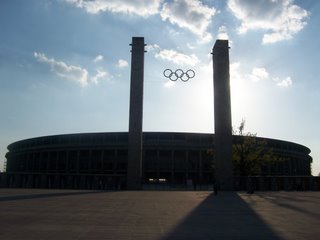 foto Simon Kijewski
foto Simon KijewskiEste foi o título de umas das notícias de um impresso berlinense para resumir a situação instalada após o resultado divulgado nesta semana sobre o teste feito nos estádios onde serão realizados os jogos da Copa do Mundo.
De acordo com o Stiftung Warentest (*), quatro estádios receberam ¨cartão vermelho¨ após a inspeção realizada pelo Instituto. No caso de pânico, por exemplo, a multidão não teria como fugir em segurança em Berlim, Kaiserslautern, Gelsenkirchen e Leipzig. Esta foi uma entre as sérias falhas, segundo o Instituto. Os outros oito estádios ficaram ainda com nota mediana. As informações divulgadas na entrevista coletiva - transmitida ao vivo aqui na Alemanha - nesta terça-feira, faltando 150 dias para o início da Copa - caíram como uma bomba.
O chefe do comitê organizador da Fifa, Franz Beckenbauer, disse que o Instituto entende de cremes para o rosto, azeite de oliva e aspirador de pó, insinuando que os especialistas não teriam competência para testar um estádio de futebol. A coletiva teria ainda gerado pânico desnecessário, na opinião de Wolfgang Niersbach, vice do Comitê. „Wir sind sehr für Panikforschung, aber gegen Panikmache’. (Somos super a favor de estudos sobre pânico, mas contra gerar pânico).
O gerente do FC Schalke 04, Peter Peters, declarou que o resultado danificou a imagem da Fifa e dos responsáveis pelos estádios, colocando-os em uma situação ridícula.
O tema tem sido explorado pela mídia alemã e várias perguntas estão no ar. Difícil entender, por exemplo, como podem estádios que foram recentemente reformados - que custaram milhões - apresentarem falhas tão sérias e só agora observadas....e ainda, como fica a segurança dos torcedores que assitem às partidas do campeonato alemão...
Mesmo dividindo opiniões, o estudo tem de ser levado a sério para não colocar em risco os fãs que estarão no Campeonato Mundial. A Fifa prometeu checar os Estádios novamente e realizar todas mudanças necessárias até o campeonato. Agora a luta é contra o relógio.
*O Instituto foi fundado em 64 pelo Governo alemão com intuito de testar os produtos no mercado. Financiado em parte pelo dinheiro público, em parte por meio das revistas Test e Finanztest, conta com 280 funcionários. O estudo está a disposição na internet no www.stiftung-warentest.de, no qual se encontra o texto abaixo, em inglês, resumindo o teste feito nos estádios.
10.01.2006 (texto retirado do site do Stiftung Warentest)
Safety in World Cup Stadiums
Four red cards
In the case of panic, some of the structurally determined deficiencies of certain World Cup Stadiums could have disastrous consequences. This is the conclusion of an investigation into the safety of the 12 World Cup stadiums carried out by Stiftung Warentest. The full results are now available online and will be published in the February edition of "test" magazine.
The Olympic Stadium in Berlin, the Veltins Arena in Gelsenkirchen and the Central Stadium in Leipzig have been found to have "considerable deficiencies" which could prove fatal. When panic brakes out spectators almost automatically rush forward in the direction of the pitch. If this escape route is blocked, as we discovered it would be in the three named stadiums, then it is a potential death-trap. The Fritz-Walter Stadium in Kaiserslautern also has "considerable deficiencies". For example there are too many things that spectators could use as weapons and the fire protection measures are not adequate.
"Clear deficiencies" were found in the stadiums in Hamburg, Frankfurt/Main, Dortmund and Stuttgart. Points of criticism are for example that there are not enough possible escape routes, there is a high risk of stumbling, and fire protection measures are inadequate. Some stadiums still do not comply with the basic principle of the FIFA Safety Regulations, in accordance with which the stadiums "must be state-of-the-art in terms of their safety provisions concerning structural and technical aspects".
The stadiums in Hanover, Nürnberg and Colgone are indeed proof that it is possible to reduce the potential congestion risk by means of structural measures. Only minor safety deficiencies were found in these two stadiums and the Allianz Arena in Munich.
For further information please read our FAQ or contact the Press Office: Tel. +49-30-26312345, e-mail pressestelle@stiftung-warentest.de
No comments:
Post a Comment